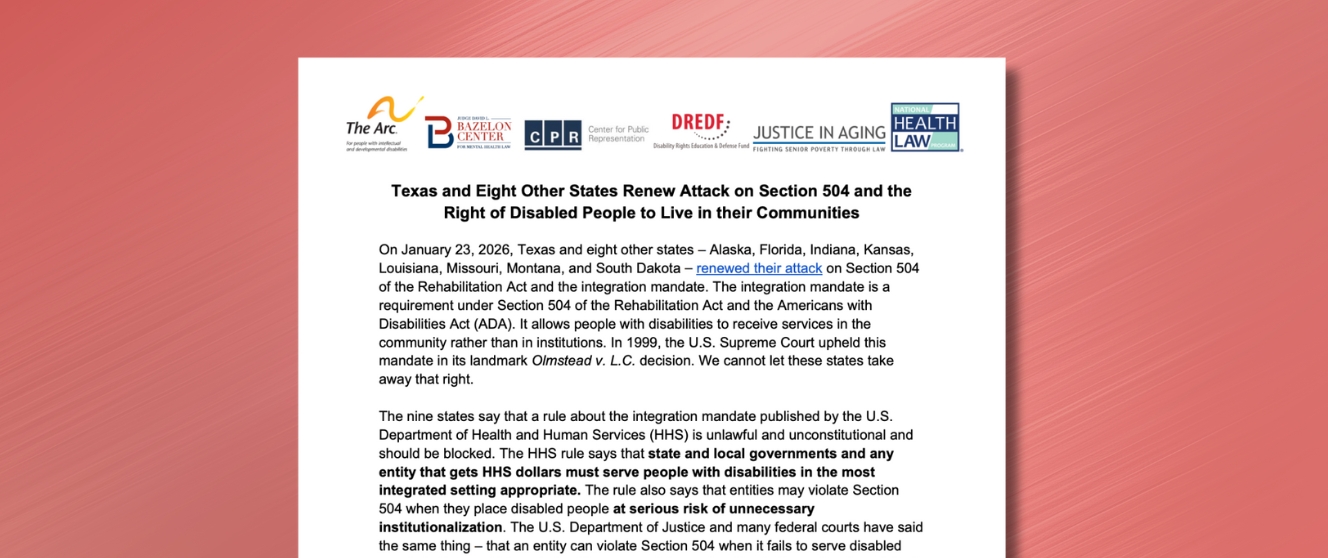
July 29, 2025 Update: HHS to Share Plans for Rulemaking
The 17 states and HHS filed a Joint Status Report asking the court to continue the pause in the case. HHS said in the report that they “plan to release additional details regarding rulemaking plans related to Section 504 in the near future.”
Download PDF version
Download Word version (.doc)
This explainer gives updates about Texas v. Kennedy. Texas v. Kennedy is a lawsuit brought by 17 states in federal court in the Northern District of Texas. The lawsuit challenges 2024 regulations from the U.S. Department of Health and Human Services (HHS). The lawsuit claims that Section 504 of the Rehabilitation Act is unconstitutional. This explainer updates our February 21, 2025 explainer.
Background
Section 504 prohibits disability discrimination. It covers the federal government and those who get federal dollars. HHS updated its Section 504 regulations in May 2024. These regulations were last updated 50 years ago. The 2024 regulations make important updates. Covered entities may not discriminate in medical treatment or child welfare. They must provide accessible websites and medical equipment. As before, states must provide services in the community. They may not segregate or institutionalize disabled people who can live in the community with supports.
The preamble to the updated regulations discussed a case about a transgender person with gender dysphoria. HHS agreed at that time that transgender people with gender dysphoria may have a disability under Section 504.
The complaint filed by the 17 states (Texas, Alaska, Alabama, Arkansas, Florida, Georgia, Indiana, Iowa, Kansas, Louisiana, Missouri, Montana, Nebraska, South Carolina, South Dakota, Utah, and West Virginia) challenges the updated regulations. The states complain about the discussion of gender dysphoria in the preamble. They complain about the regulation on integration. The complaint asks the court to strike down the updated Section 504 regulations. It asks the court to rule that Section 504 is unconstitutional. This would have a devastating impact on people with disabilities who routinely face discrimination.
Right now, the case is “stayed,” meaning it is on pause. See DREDF’s Protect Section 504 webpage for more information.
April 11 Report: States Abandon Claim that Section 504 is Unconstitutional
On April 11, 2025, the 17 states and HHS filed a Joint Status Report asking the court to continue the pause in the case. The states said they are no longer challenging the constitutionality of Section 504 of the Rehabilitation Act. This concession shows the power of the disability community’s advocacy. The report says:
Plaintiffs further clarify that they have no intention to seek any relief from this Court on Count 3 (Section 504 is Unconstitutional) of their Complaint [or]their Demand for Relief at d–e [which would have declared Section 504 unconstitutional and blocked HHS from enforcing Section 504]. And nothing in Plaintiffs’ Complaint seeks to . . . prevent the Federal Government from allocating spending or applying the provisions of the Rehabilitation Act to any recipients of such funds.
This means that the district court in Texas will not rule on whether Section 504 is constitutional. This question will not go to the Fifth Circuit Court of Appeals or the U.S. Supreme Court. The bad news is that the states have not dropped the case, and HHS has joined the states in their attack on the rights of transgender people.
April 10 Notice: HHS Rejects its Prior Position that Gender Dysphoria Can Be a Disability
On April 10, 2025, HHS published a notice in the Federal Register about the preamble to the Section 504 regulations. The notice says that the preamble’s statement about gender dysphoria “does not have the force or effect of law” and “cannot be enforced.”
HHS’s April 10 notice does not change existing caselaw holding that gender dysphoria may be a disability. We agree with that caselaw. We condemn discrimination against transgender people.
The HHS notice affects the claims in the Texas v. Kennedy lawsuit about gender dysphoria. The states and HHS are no longer in disagreement about the discussion in the preamble. This part of the lawsuit is likely “moot,” or no longer a dispute for the court to decide.
What Now?
The Texas v. Kennedy case remains a significant threat to the rights of people with disabilities. The 17 states continue to challenge the updated Section 504 regulations which include:
- the right to receive services in the community instead of institutions
- a ban on disability discrimination in medical treatment decisions including —
- life-saving healthcare
- organ transplants
- allocation of scarce resources like ventilators during a pandemic
- accessible medical equipment, websites, and kiosks
- reasonable accommodations and effective communication
The parties’ next filing is due on July 21, 2025. We urge those of you from any of the 17 states to continue advocating for your state’s Attorney General to withdraw from the case.
We are monitoring the case and will continue to provide you with updates. We will continue to defend the HHS Section 504 regulations and the important rights disabled people have fought so hard for.
We urge everyone to fight to defend Medicaid. The promise of Section 504 is empty without Medicaid. Medicaid funds the services and supports disabled people need to live in the community. For more information and tools check with your local disability organization and visit:
- Medicaid is Under Attack! Tell Your Elected Officials “Hands Off Our Medicaid!” | DREDF
- Medicaid Action Month | National Health Law Program
- 2025 Medicaid Toolkit | The Arc
We must all work together – your advocacy is important!
This update was prepared by The Arc of the United States, Disability Rights Education & Defense Fund, Bazelon Center for Mental Health Law, Center for Public Representation, and the National Health Law Program, with contributions by Alison Barkoff, Hirsh Health Law and Policy Associate Professor at George Washington University.


